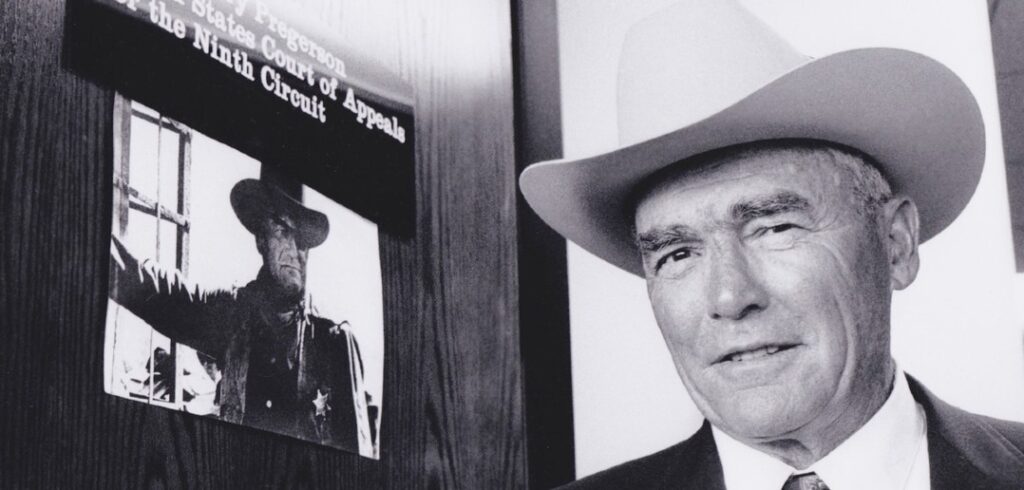On Friday, October 29, the Center for Judicial Events & Clerkships (CJEC) and Reed Lecture Series co-hosted a virtual event on the life and legacy of Judge Harry Pregerson. The two-part event opened with a screening of the documentary film titled “9th Circuit Cowboy: The Long, Good Fight of Judge Harry Pregerson” followed by a discussion with two-time Academy Award-winning filmmaker Terry Sanders and Judge Dean Pregerson of the U.S. District Court for the Central District of California and son of the late Judge Harry Pregerson.
Judge Harry Pregerson—who was often seen wearing a cowboy hat and leather boots—served on the federal bench as judge of the U.S. District Court for the Central District of California and later the U.S. Court of Appeals for the Ninth Circuit for nearly 50 years. He was well known for being guided by his conscience.
Daniel J. Capra, Reed Professor of Law and CJEC faculty director, and Suzanne M. Endrizzi ’96, CJEC assistant dean, co-moderated the post-screening discussion, which included talking about the broader importance of public interest and service to the role of the judiciary as well as Judge Pregerson’s life, his commitment to public service and social justice, and how that commitment shaped his judicial philosophy.
A Champion for Veterans, the Homeless, Poor, and Powerless
Prior to joining the bench, Judge Pregerson served as a first lieutenant in the U.S. Marine Corps from 1944 to 1946. He received the Purple Heart after suffering severe gunshot wounds to his legs in Okinawa during World War II.
After returning home and graduating from UC Berkeley in 1950, Judge Pregerson worked in private practice for more than a decade. He entered the judiciary in 1965 as a Los Angeles Municipal Court judge, assumed the bench in the Superior Court of Los Angeles County, and served as judge with the U.S. District Court for the Central District of California for 12 years. Judge Pregerson joined the Ninth Circuit in 1979, after being nominated by President Jimmy Carter, and took senior status beginning in mid-December 2015. He wrote more than 235 published legal opinions over the course of his career.
In 1972, Judge Pregerson blocked the construction of a freeway on the heels of a civil rights lawsuit. He helped draft an agreement in the settlement that required the hiring of women and minorities for many construction jobs, as well as established a training program near the site to teach basic carpentry and iron work to the newly hired employees.
The Salvation Army and the Bell Homeless Shelter were also created on Judge Pregerson’s watch, due to various public-private partnerships forged between the late judge and the federal government.
Choosing Conscience or the Law?
When Wyoming State Senator Alan Simpson asked Judge Pregerson during his Senate Confirmation hearing in 1979 that, if he had to choose, would he follow his conscience or the law, Judge Pregerson stated that his conscience was “a product of the Ten Commandments, the Bill of Rights, the Boy Scout Oath, and the Marine Corps Hymn.” Judge Pregerson said that if he had to choose, he would follow his conscience.
“My dad was somebody who didn’t think that human suffering should be brushed under the table. He was someone who had the strength, character, vision, and purpose to decide—if we’re here for just a short period of time—how can I use whatever talent I might have to help other people?” Judge Dean Pregerson recalled.
He added: “As Judge Michael Daly Hawkins [senior U.S. Circuit judge of the U.S. Court of Appeals for the Ninth Circuit]said at his memorial … Harry, in many ways, was a Marine, who embodied the ‘no one left behind’ [motto]and happened to also be a judge.”
Judge Pregerson served as a senior federal judge until his death on November 25, 2017 at age 94.
Sanders, who developed close relationships with the Pregerson family after attending the late judge’s memorial in 2017, quickly became interested in Judge Pregerson’s life and career. “He wanted to make the world a better place,” Sanders said of Judge Pregerson.
“There’s the whole tradition of how the cowboy comes to the rescue … and I think that’s what he identified with,” Sanders added. “People called him a lot of things, but I think everyone I talked to—even right-wing people [who]didn’t approve of him—still respected him because they knew he was an honest man.”
Takeaways from Judge Pregerson’s Legacy and the Film
Sanders, who has produced and directed more than 70 award-winning dramatic features, theatrical documentaries, television specials, and portrait films, called “9th Circuit Judge” a “labor of love.”
“One of the prime objectives is to inspire law schools [and]the future lawyers and judges with an example of an American hero,” Sanders said.
Echoing Sanders’ sentiments, Judge Dean Pregerson reflected on the end of the film which depicts his father’s memorial, saying, “When the bugle plays at the actual ceremony, there’s a major from the Marines who says in a little bit of a stage whisper, ‘Lieutenant Pregerson, you are relieved. We have the watch.'”
“I think that says it all,” he continued. “All the folks listening, students—you have the watch.”
Asked what his father would say to current law students if he were alive today, Judge Dean Pregerson answered that it would be to pursue your passions, not a salary. “You may not end up practicing law—maybe you will do something else,” he said. “But whatever you do, don’t do it for money.”
“For all of the work and energy he put into things, my dad enjoyed his life, what he did every day, and the people that he worked with,” Judge Dean Pregerson added.

